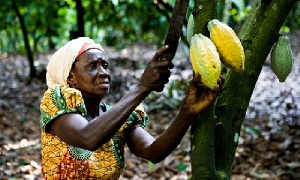As the campaign season get heated up, election day draws closer and the debate on who has the best manifesto to rescue the country from its current state, I take a critical look at one major issue confronting Ghana’s agricultural sector; the perpetual decline mainly due to climate change.
I will focus on the ruling National Democratic Congress (NDC) and the opposition New Patriotic Party (NPP) since they are the two major political parties currently in the country. But will first talk about the NDC’s manifesto since it is the first to be launched, whiles we await that of the NPP.
The NDC’s manifesto appears to fail to address the seriousness of climate change impact on Ghana’s agriculture sector. Climate change is a phenomenon that is currently posing a lot of developmental challenges to Ghana, particularly in the agricultural sector, which continues to witness a sharp decline in production.
The 2016 manifesto of the governing NDC makes some promises as to how they intend to deal with the decline of the agricultural sector, but it fails to mention the impact of climate change on the sector much less how they are going to address it. It appears that either government is oblivious to the danger of climate change to the growth of the economy or it has deliberately turned a blind eye to it.
The domestic agricultural sector employs over half of Ghana's workforce and consistently accounted for an estimated 40 percent of GDP annually. But the sector has been left at the mercy of climate change, which has caused consistent and significant decline over the last five years, and that has worsened its attractiveness.
According to media reports citing the documents from the Ghana Statistical Services Authority (GSSA), in 2010 alone, the sector contributed 29.9% to GDP, but that declined to 25.6% in 2011, then to 22.7% in 2012. The decline continued the following year to 22.4%, whiles in 2014, it further dropped to 21.5% and at worst in 2015 where it declined to 0.4% a problem that can partly be blamed on the effect of climate change.
The term climate refers to the average weather conditions, of any given geographic region, estimated over a long period of time, from a few weeks to infinite years, but generally for as long as 30 years or more (NASA, 2008; Wikipedia, 2013a). Climate change, therefore, describes changes in the state of the atmosphere over time scales ranging from decades to millions of years. These changes can be caused by processes inside the Earth, forces from outside (e.g. variations in sunlight intensity) and, more recently, human activities that generate pollutants.
We in Ghana may think we are not guilty of the accusations of industrial pollution often leveled against the giant industrialized nations, yet lurking in our own backyard are great issues of concern, including plastic pollution, the proliferation and dominance of illegal mining (Galamsey), uncontrolled felling of trees, unrestrained silting of our lakes, lagoons, and rivers by run-offs and domestic spillage among other activities that contribute to climate change.
Although President John Mahama outlined some 15 key initiatives his government will roll out in the agricultural sector, if voted into power in his second term, he said nothing about how to tackle the causes and the effects of climate change on the agricultural sector.
The fate of agricultural systems on a wobbly weather and climate system accounts, to a great extent, for the seemingly perpetual decline in agricultural and its impact on overall economic output of Ghana.
Farmers are crying foul over their low harvest, fisher folks are also lamenting the reduced catch that has hit the sector, allegedly as a result of changes in seawater temperature and other environmental factors.
Fish farming
The future growth of fish production is under the threat of climate change due to the variability of temperature and erratic rainfall patterns. Recent changes in temperature and rainfall patterns are reflecting negatively on fish farming, contributing to a major loss of production as some fish farmers say the impact of climate change may push them out of business.
While the government continues to distribute outboard motors to fishermen to help them go fishing, its manifesto failed to outline urgent adaptation measures to enable the fishermen to cope with climate change.
Food production
There has been a recognised change in rainfall patterns in Ghana over the years and this has been hard for most farmers in the country especially in 2015. The dependency of major farming communities on rainfall makes climate change effects such as drought and flooding a critical threat.
The Brong-Ahafo region is famously recognised as the breadbasket of this country. It produces the most vital and widely consumed food crops such as yam, tomatoes, cassava, plantain, maize and rice. Both commercial and subsistence farmers in that region have been struggling to survive the harsh effects of climate change as their crops die due to drought. It is expected that food prices will jump up due to the drought in Ghana causing low yields and harvest.
But the NDC manifesto failed to address the seriousness of the impact of climate change on food production in the country.
Cocoa sector
The cocoa sector, which is the highest foreign exchange earner for the country is estimated to provide livelihood to more than 800,000 households in Ghana. In spite of its importance to the economy, cocoa production has seen a sharp decline over the last few years, from one million metric tonnes in 2010/2011 to less than 700,000 tonnes and still declining now.
Climate change experts have predicted that expected increase in temperatures will lead to further massive declines in cocoa production between now and 2030 in Ghana. Industry players and crop scientists are putting measures in place to increase yield, but climate change seems to negate that effort and investment.
Indeed, some farmers are already selling their farmlands to illegal miners (galaxy operators), whose activities are further harming the environment and deepening climate change, which continues to deplete gains from cocoa. The vicious cycle continues.
The newly launched NDC manifesto failed to explain how the government will tackle this one too, and that for yours truly, makes the NDC manifesto an unrelaible piece of a document when it comes to addressing the real challenges facing the agricultural sector.
A number of things the NDC manifesto should have contained, to make it a viable documents for addressing the real issues facing the agricultural sector:
1. The NDC should have stated in their manifesto a plan to set up a permanent Climate Research Outfit that will operate in a multi-disciplinary manner with specialists who will produce relevant solutions to climate change and deliver them to farmers as and when they need them.
2. The NDC should have stated in their manifesto how they will provide advisory services such that farmers can plan and take advantage of a coming good rainfall season to maximise farm output and incomes.
3. The NDC should have told us in their manifesto how they plan to support the Ghana Meteorological Agency with state-of-the-art equipment to enhanced their work in generating and delivering climate-related information.
4. They should have also indicated what adaptation methods or the plan to mitigate the current impact of climate change on our economy as far as agriculture is concerned.
It is about time political parties in Ghana develop a robust and effective policy on climate change especially on the Agric sector as part of their campaign promises and ensure its implementation when they are voted into power.
This, when done, will see an upward adjustment in food production, a strong economy and availability of food for all in Ghana.
Opinions of Saturday, 8 October 2016
Columnist: Kofi Assan



















